London Film Festival 2019, Days 3 – 5: Eye Catching Indies & Disappointing Awards Bait
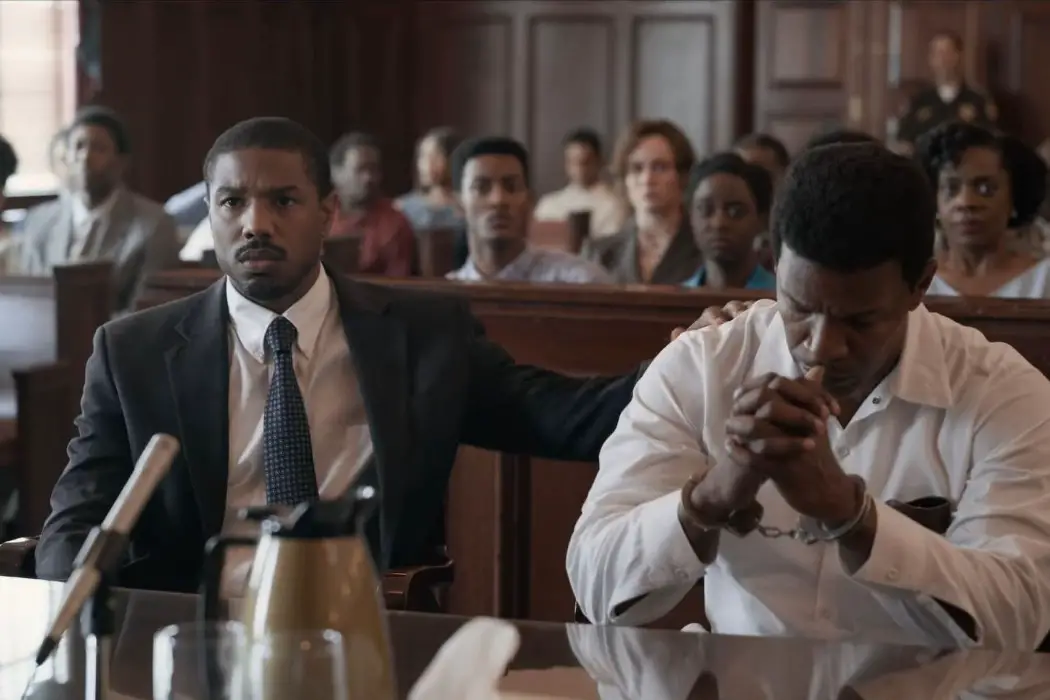
Alistair is a 25 year old writer based in Cambridge.…
This year’s London Film Festival is now in full swing – meaning there are lots more reviews from the Film Inquiry team still to come. Here’s what we saw on days three, four and five.
The Antenna (Orçun Behram)
Faisal Al-Jadir: Almost deceiving us into thinking that it could have been set in 1984, Orçun Behram’s The Antenna explores the consequences of installing the mysterious, titular device in a worn down isolated apartment complex in a dark Turkish future. When an engineer installs the government antenna on the roof, he mysteriously plunges to his death.
The somewhat sleep-deprived superintendent Mehmet (Ihsan Onal), finds himself questioning the incident and instinctively recognises the dystopian nature that haunts the building. He tries to persuade Yasemin (Gul Arici) to leave the place and escape the clutches of her domineering father, Firat (Enis Yildiz) but her fears and insecurities get the better of her. In one of the film’s more obvious conversations, Firat talks about the family’s bird trying to escape only to be wounded by a crow. While the threatening message is conveyed quite cleverly, it is to the detriment of the film that any such dialogue should be uttered because of the forthcoming beautifully intricate visual storytelling.
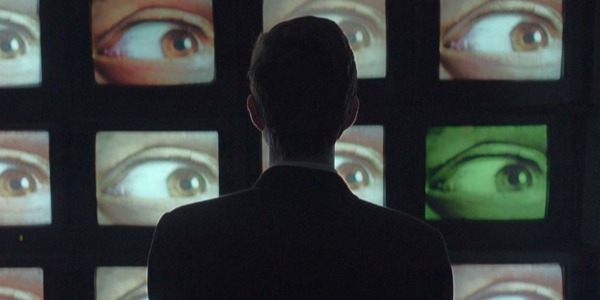
The various residents become captivated and hypnotised by various bits of propaganda and soulless commercialism that now fills their television screens, especially when a woman becomes so convinced of an elixir that will bring her youthful years back. Behram’s cynicism mixes with paranoia as we soon discover copious amounts of a strange black substance pouring out of the pipes and tiles, threatening to infect people with a visceral rhetoric and take over their minds and bodies.
While David Lynch has previously delighted in showing us the murky subterranean nature beneath an ideal American life as he did in Blue Velvet, Behram cuts out the middleman and lets us know that things are always bad, and they could always get worse. The film boasts a muted colour palette, with the apartment complex’s exteriors and interiors looking dirty white, and the sky appearing gloomy and grey. The low-lighting that dominates the night-time scenes engulf the residents in a nightmarish void of uncertainty, and we are treated to a right-brain treatment of this world.
In many ways, this isn’t a narrative film as much as it as a nightmare or an experimental homage to German Expressionist cinema. It is Behram’s eye, Engin Ozkaya’s gothic photography, Ufuk Bildibay’s surreal production design, Can Demirci’s schizophrenic score and the angsty sound design that makes this atmospheric horror so fresh and inventive. While the cast is effective, it is Onal’s internal, taciturn demeanour that allows him to transition from a Kafkaesque character to an Orwellian truth-seeker.
Days of the Bagnold Summer (Simon Bird)
Alistair Ryder: Best known to British TV audiences as the star of The Inbetweeners and Friday Night Dinner, the most surprising thing about Simon Bird’s directorial debut is the fact it doesn’t neatly fit into his cringe comedy wheelhouse. Adapted from a graphic novel by Joff Winterhart by Lisa Owens, Days of the Bagnold Summer is a charming and quintessentially British character comedy about the seemingly endless boredom faced by teenagers and their long suffering parents during the summer school holidays.

Far closer in spirit to the lighter works of Mike Leigh than the broader material that made him a well known figure in British comedy, Bird’s debut is innately humanistic, with cross-generational appeal. It’s a perfect film to take your mum to see, even as its portrayal of a fraught mother-son relationship frequently hits a little too close to home.
Daniel (Earl Cave) was supposed to fly over to Florida to spend summer with his dad, but at the last minute, plans get cancelled and he’s stuck with his librarian mum Sue (Monica Dolan) for six soul crushingly dull weeks in suburbia. During this time, tensions run high, with every one of Sue’s attempts to spend time with her awkward metalhead son being shut down by his adolescent mood swings – and her attempts to finally get back on the dating scene nearly a decade after her divorce from Daniel’s father, which includes dating Daniel’s history teacher (Rob Brydon).
The show is stolen by Monica Dolan’s performance, one of the finest screen depictions of a very stereotypically British kind of mother. The low concept of the storyline works to the advantage of such a lived-in turn; you get the sense that the character exists outside of the confines of this film’s narrative, with Dolan only slightly heightening a familiar archetype so it works as a comedic lead. Her relationship with her son will be familiar to anybody who has ever been a teenager – for older viewers looking back on Daniel’s moody behaviour and (very likely) cringing at how familiar it feels, it is very likely to have the Lady Bird effect, leaving you rushing to call your mum as soon as you walk out of the cinema. It may not be the most hysterical comedy you see this year, but I doubt any will feel as keenly observed as Days of the Bagnold Summer.
The Girl with a Bracelet (Stéphane Demoustier)
Gus Edgar Chan: Stéphane Demoustier’s courtroom drama The Girl With A Bracelet—less a ‘whodunnit’ than a ‘didshedoit’—revolves around the trial of Melissa Guers’ stolid Lise, accused of brutally murdering her best friend two years prior at the age of 16. The specifics of the case, unspooled within a taut 93-minute runtime, are of fringe importance; Demoustier is much more interested in interrogating how Lise’s family react to the accusation, and how a teenager on the cusp of adulthood navigates her way through extraordinary circumstances.
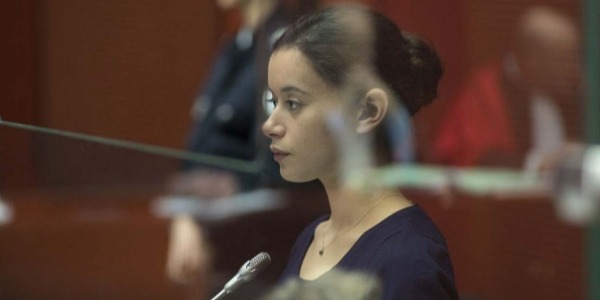
Each detail of the case serves to layer on the ambiguity. Guers performs her role with pinpoint precision, a fragile cipher who functions as both cold-blooded killer and traumatised teen, while Anaïs Demoustier’s rugged prosecutor embodies a convincing voice of dissent. Indeed, everything is left up to interpretation, every individual act scrutinised and scoured: a sunken head is damning, a slip of the plural tense means everything and nothing.
At its heart, Demoustier’s film is a quietly moving portrayal of family dynamics: how much parents know of their own daughter, and how difficult it is to let them lead their own lives. Lise, hostile and impenetrable, is more promiscuous and carefree than she lets on to her family—The Girl With A Bracelet examines how we view innocence, and how the typical innocent should behave.
In front of her brother, she’s playful; against the backdrop of a court, or confronted by her parents, she recedes to the background. In a way, Demoustier’s film is an inverse coming-of-age film, interested in how a teenage girl develops when the most important years of development are stunted. The final images are telling and tragic.
And yet, in spite of the empathy Demoustier shows Lise, there is a striking ambiguity to her actions. One could view this film as a testament to family resolve—superbly encapsulated in the mother’s (Chiara Mastroianni) barnstorming speech—and an unfairly maligned daughter, or one could view this film as a chilling, gripping study of a sociopath. As the court case makes clear several times over, it’s up to your own interpretation.
Hope Gap (William Nicholson)
Maria Lattila: William Nicholson is known better as a screenwriter. He’s the man behind films such as Breathe, Everest and Unbroken and he now returns to the director’s chair for the first time since 1997. Hope Gap is based on the play Nicholson wrote, which is based on his own experiences of his parents’ divorce at a later age.

Grace and Edward (played by Annette Benning and Bill Nighy, good but both on autopilot) have been married for nearly 29 years when Edward announces he is leaving the admittedly difficult Grace. Their son Jamie is equally devastated and Grace finds it hard to navigate a future without her husband.
Hope Gap is an infuriatingly bland film. There is so much potential here and a wonderful cast, it’s a shame the end result isn’t better. It’s a bold film from Nicholson; both his parents come across as pretty terrible, but human. They’re fascinating characters and Nicholson shines in creating wonderfully real and warm smaller moments, such as making a cup of tea or chopping tomatoes. The film has a lived-in feeling, but it doesn’t erase the fact that Hope Gap is simply too generic and dull with characters you won’t want to root for.
Josh O’Connor turns in a phenomenal performance as Jamie, who is stuck between two adults refusing to communicate. His performance isn’t flashy like Benning’s but all the more powerful for it. Benning is her usual self; witty, smart and commanding, but it’s also a performance which doesn’t reveal any new sides of the actress. Nighy doesn’t get much to do, but this is much more a story from Jamie and Grace’s point of view. Hope Gap could have been a better film all around, but it’s worth a watch for O’Connor’s performance.
Just Mercy (Destin Daniel Cretton)
Nathan Osborne: Just Mercy recounts the true story and career of Bryan Stevenson, an attorney who takes the case of a wrongfully imprisoned man awaiting execution on death row. While, on paper at least, it sounds destined to be this year’s big award season-prime tearjerker, the Just Mercy filmmakers cannot resist and refuse to escape the genre trappings, conventions and comparisons that ultimately weight this important tale down.
Likely to please the same demographic who awarded Green Book the Best Picture Oscar at the most recent Academy Awards, Destin Daniel Cretton’s feature- his fourth overall – can be added to the pile of “true life stories whose real power and emotion lies in the real events, not the film itself”. In truth, said filmmaking brings little to the story itself, tripping over the courtroom drama formula and the hallmarks of similarly-centred narratives we have seen done countless times before. That’s not to say that the film doesn’t land on something special every now – a palpable execution scene is brilliantly-constructed – but these moments are the exception, not the rule and it struggles to add up to more than the sum of its parts in the long run.
Michael B. Jordan registers a decent performance, although it still calls into question his leading man capabilities, while Jamie Foxx’s turn imbued with anguish and frustration is well-dialled for sympathetic effect. Although both are underused, Brie Larson is impressive and Rafe Spall makes his mark on the narrative in the latter half, rounding out the supporting cast strongly.
It’s mightily disappointing that Just Mercy leans so heavily on a formula to tell its emotionally-rife tale of prejudice and (in)justice. There really is no denying its power and many will be moved by the film’s emotionally-wrought and earnest climax – but I would be hesitant to argue that it was because of anything the film itself actually does in and of itself. As ingrained as To Kill A Mockingbird is in the Alabama town on screen, conventions are similarly stuffed into Just Mercy and the film suffers from an overfamiliarity that weakens this well-intentioned feature.
Leap of Faith (Alexandre O. Philippe)
Faisal Al-Jadir: Even if Alexandre O. Philippe didn’t cover every corner in 78/52, he offered a beautifully kaleidoscopic study of Psycho, by gathering many minds to discuss a wide range of interpretations and ideas, thereby enriching it and amplifying it’s relevancy for the 21st century. With The People vs. George Lucas, Philippe explored the oddball nature behind the overly-passionate fandom of the Star Wars franchise, with a great sense of humour to accompany the level of concern he may have for some of the more bitter fanboys.
Leap of Faith is, in many ways, a far cleverer and more ambitious film than the two aforementioned documentaries. Throwing out all the bells and whistles, the director places all the emphasis on the source, with only William Friedkin sharing his anecdotes and thoughts about The Exorcist.
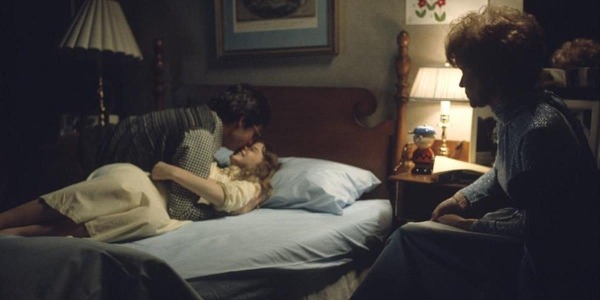
In fact, this isn’t just about the cinematic treatment of William Peter Blatty’s novel. It is an opportunity for Friedkin to meditate on his personal experiences, ideas, stories and thoughts. Not only are they about the film industry, but they also extend to discussions on the cosmos, destiny, dreams, existence, fate, religion and spirituality.
Friedkin identifies himself as an agnostic, but is constantly fascinated by religious imagery and symbols that plant ideas in our minds, which make things such as demonic possession so much more potent. Believing that our sense of free will is an illusion, he believes that there is a futility to humankind’s journeys, and that our destinies are already determined by an unknown entity. His words about deja vu are both beautiful and quite haunting, but it is comforting to hear it from him.
One of the more heart-warming anecdotes is about his visit to a zen garden in Kyoto with three separate rock formations spread apart in a specific layout. Not knowing who put them there or why they did it in the first place, Friedkin talks about his emotional experience in realising what they were about. He is a man who is so content with not knowing what lies in store for him as he exists or for his soul when it departs. He is utterly fascinated by the mysteries of the world he inhabits and is painfully aware of the loneliness of humankind.
The film smartly allows Friedkin to present himself as a three-dimensional character, one who understands his flaws and becomes wiser as a result. His brutal honesty and criticisms about everything, including his own films, is so refreshing because we know he only has the best intentions.
Accompanying a quietly-passionate score and poetic cinematography when we venture into new locations, the film is also laced with a lot of humour, not just from Friedkin, but also through the editing and various bits of archive footage, occasionally creating witty illustrations of Friedkin’s narration.
Your appreciation for the film will all depend on whether you appreciate listening to the legend speak and whether the ideas and theories resonate with you. Friedkin doesn’t expect you to agree or believe in everything he says, but he firmly believes that what you bring to a film, will determine how much you can take away. This writer believes that the only thing more fascinating than a William Friedkin film is a William Friedkin story…and this is a great story.
Monsoon (Hong Khaou)
Maria Lattila: Henry Golding plays Kit, who travels to Vietnam to scatter his mother’s ashes. It’s not the Vietnam he escaped as a child and he grows restless visiting familiar places and trying to find a connection to his homeland.
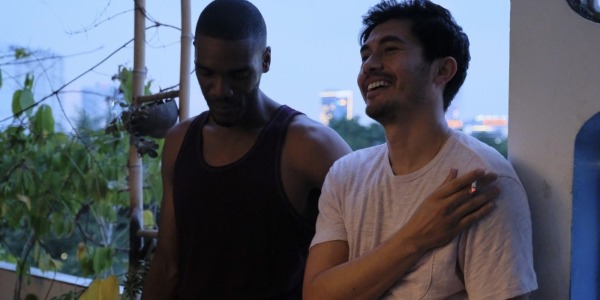
Monsoon is the follow up to director Hong Khaou’s acclaimed feature Lilting. It’s a beautiful and lyrical exploration of personal and cultural alienation. However, it all feels too familiar. Films such as Columbus and The Farewell have already explored a similar subject matter and while there isn’t anything wrong with Monsoon, it never quite develops its own identity. It has some interesting things to say about the war and Kit’s uneasy relationship with a handsome American man proves that one of the most destructive wars in history still isn’t quite behind us.
Golding carries the film, oozing charisma and leading man material. We’ve never seen him quite like this and it feels like a challenging role for Golding, who we’ve seen in much louder, brasher films. Kit is often silent and just wondering around Saigon or Hanoi. There’s no intrusive voice overs, we can’t tell what’s on his mind. Golding does remarkably well even if a lot of the time he has very little to do, but be a blank mirror for us to project our own feelings on.
While Monsoon is pretty to look at, it doesn’t make up for the overwhelming familiarity of the narrative. There isn’t anything wrong here exactly, but it all feels dated and used, like that one comfortable t-shirt you refuse to throw away although you should have after the moths got to it. The moths have definitely got to Monsoon.
More reviews from London Film Festival are on their way, stay tuned to Film Inquiry!
Does content like this matter to you?
Become a Member and support film journalism. Unlock access to all of Film Inquiry`s great articles. Join a community of like-minded readers who are passionate about cinema - get access to our private members Network, give back to independent filmmakers, and more.
Alistair is a 25 year old writer based in Cambridge. He has been writing about film since the start of 2014, and in addition to Film Inquiry, regularly contributes to Gay Essential and The Digital Fix, with additional bylines in Film Stories, the BFI and Vague Visages. Because of his work for Film Inquiry, he is a recognised member of GALECA, the Gay & Lesbian Entertainment Critics' Association.













